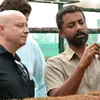Meet the farmer who is creating 'Green Commandos' of youth to promote ecological farming
Farmer Samir Bordoloi is catalysing the local food economy and building a network of indigenous food advocates and entrepreneurs who are bridging the urban-rural divide and making farming aspirational again.
The northeast region (NER) of India has been facing an increased food insecurity problem as a result of environmentally harmful and unsustainable agricultural practices. Decades of ethnopolitical conflict, an adversarial approach to the region’s biodiversity, and preconceived notions of the region’s ‘backwardness’ have resulted in the immeasurable exploitation of natural resources and the communities that rely on them. Caught in the middle is the youth of the region, who have been disconnected from their land and heritage, and are now facing an identity crisis.
Recognising the largely unexplored link between farmer communities and youth, Samir Bordoloi created the Green Commandos programme, through his organisation Spread NE - (Society for the Promotion of Rural Economy and Agricultural Development, Northeast). Spread NE is a community of low-cost and organic farming advocates who are restoring dignity, agency, and choice of the farmers, making it an attractive profession in the long run for the coming generations.

Farmer Samir Bordoloi
A farmer since birth
Samir Bordoloi is widely recognised in NER as ‘Farmer Samir Bordoloi’. The son of an IAS officer who was placed in Arunachal Pradesh, Samir’s best memories have all been connected with nature and farming in and around Tawang.
The natural choice for him was to study chemical agriculture at the Assam Agricultural University, after which he made a conscious decision to take up a job that has a close and direct engagement with farming communities. It was during this early experience when he saw the alarming impact of mono-cropping, chemical fertilizers, and pesticides on the farming communities. It was here that Farmer Samir made a commitment to promote organic farming and serve the many farmers of India in a way that is dignified, aspirational, healthy, and fair.
A journey of innovation and exploration
Armed with this new conviction, in 2005, Farmer Samir established a ‘Plant Health Clinic’ in Jorhat, Assam, aimed at providing curative solutions to farmers about their plants. When he noticed that no one came to visit his clinic, he took it to the farms and provided communities with advice, access to organic inputs, and solutions to shift towards organic forms of farming.
Early on in this journey, Farmer Samir met Peggy Carswell, a Canadian volunteer and coordinator of a local NGO, Fertile Ground. She asked him why he was promoting organic farming through costlier methods, when he could easily collaborate with nature itself to find methods and thus, significantly reduce the cost for farmers.
Set on a journey of exploration and creation, Farmer Samir started to innovate methods in which farmers could use their land and the environment around them to undertake zero-cost organic farming. At the same time, he understood through his experience the powerful potential and importance of youth in the larger connection between land, farming, nature, and cultivation. More specifically, Samir realised that youth could hold the key to transforming farming practices towards organic, low-cost, and environment-friendly methods, thus making farming aspirational again for generations to come.

Samir Bordoloi engaging with the youth
The birth of Green Commandos
Engaging over 300 youths from across the country as Green Commandos, Farmer Samir created a growing network of advocates who support each other to promote zero-cost organic farming in their regions. The role of this powerful network of change agents is not just limited to energising farming communities but also marketing and connecting their produce to urban centres and ultimately ensuring that farmers can earn a dignified and sustainable living.
After going through a residential-experiential training journey at Farmer Samir’s Learning Centre, the Green Commandos started to develop the critical thinking and empathetic skills required to create and contribute to a healthy and sustainable food production cycle. The result of a residential training programme also enables the establishment of connections between these Green Commandos who collaborate towards this shared vision of ‘local people, growing local food, creating local economies’.
While the stories of impact are far and many, one method that the Green Commando’s have been using is the ‘jhum’ cultivation. In existing land that have already been burnt, farmers have been taught to use bamboo forests and groves to create natural carbon sinks, hence reducing the impact of global warming. The adverse impact of mono-cropping is being reversed by creating edible food forests, using existing forest land, rather than destroying and replanting.
With a collective engagement of over 2,500 farmers in the NER region, the Green Commandos have already created larger impact than just ecological-friendly farming methods. These farmers are now starting to become independent, their incomes have started to rise, youth are starting to explore full-time careers in farming, and there is a greater social cohesion all around.
(Edited by Suman Singh)








